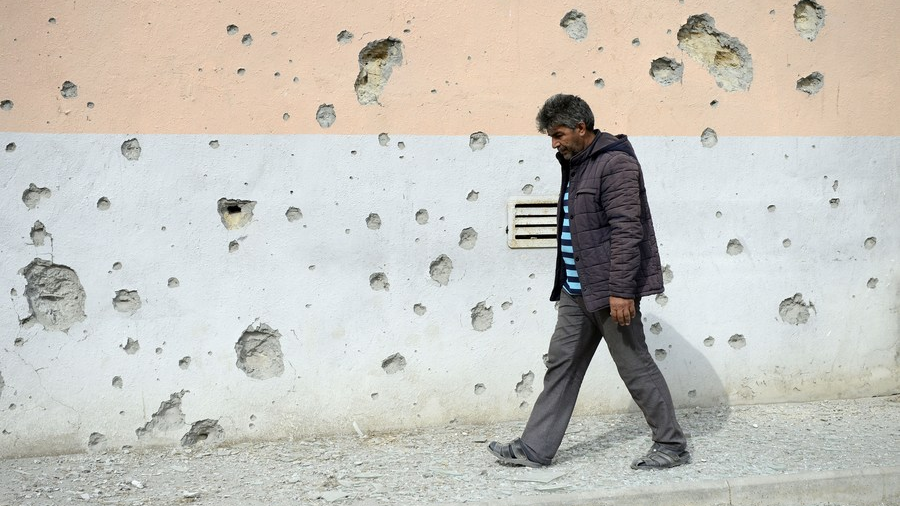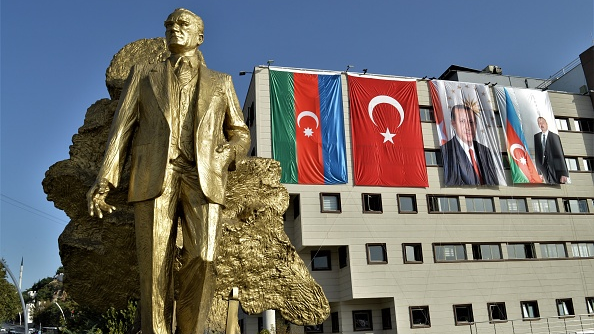
A man walking by a house damaged during clashes in the Tartar district bordering the Nagorno-Karabakh region, September 29, 2020. /Xinhua
A man walking by a house damaged during clashes in the Tartar district bordering the Nagorno-Karabakh region, September 29, 2020. /Xinhua
Editor's note: Li Yun is a researcher at the Institute of Foreign Military Research of the Department of War Research, China's People's Liberation Army (PLA) Academy of Military Sciences. The article reflects the author's opinions, and not necessarily the views of CGTN.
On September 27, conflict broke out between Azerbaijan and Armenia in the Nagorno-Karabakh region. Both sides accused each other of violating the ceasefire agreement and taking the lead in launching a military offensive. Subsequently, both countries declared a state of war. Armenia announced a general mobilization. Azerbaijan announced partial mobilization. To this day, the two countries still hold different opinions about each other's and their own war losses and combat progress.
According to Russian news website Life, in terms of the military strength comparison between the two countries, the total population, the number of people suitable for service, the number of active force posts. and the number of reserve personnel in Azerbaijan are 3.3 times, 2.7 times, 2.8 times and 1.5 times that of Armenia, respectively. The number of tanks, armored vehicles, self-propelled guns, barrel guns, rockets and other major army combat weapons in Azerbaijan is 5.2 times, 1.9 times, 4.9 times, 1.5 times and 2.4 times of that of Armenian. The number of Azerbaijan's fighters, assault aircraft (bombers), transport aircraft, attack helicopters, and transport helicopters and other air force's main combat weapons are 4.3 times, 1.3 times, 0.3 times, 0.9 times and 2.4 times that of Armenia. In terms of naval equipment, Azerbaijan has a navy, while Armenia, as a landlocked country, has no navy.
From these data one can tell that without the intervention of external forces, Armenia is obviously not Azerbaijan's opponent.
However, the history of military conflicts between countries after the Cold War has proved that: in the region which has been focused on by the world's major powers, the results of military conflicts or wars between small and medium-sized countries in the region often do not depend on the strength comparison between the conflicting parties, but on the game of big powers behind them. This is why despite the great disparity in military strength between Armenia and Azerbaijan, the Nagorno-Karabakh region has remained independent to this day.
After the outbreak of the conflict, Russian President Vladimir Putin repeatedly stressed the necessity of immediate ceasefire and the resumption of the resolution of the conflict through political and diplomatic channels.
On the other hand, Turkey publicly denounced Armenia for provoking the conflict. Turkish President Recep Erdogan tweeted, "The Turkish people will as always support our Azerbaijani brothers with all their strength."

National flags of Azerbaijan and Turkey, and portraits of Turkish President Recep Tayyip Erdogan and Azerbaijani President Ilham Aliyev are seen behind a statue of modern Turkey's founder Mustafa Kemal Ataturk in Kecioren district, Ankara, Turkey, October 6, 2020. /Getty Images
National flags of Azerbaijan and Turkey, and portraits of Turkish President Recep Tayyip Erdogan and Azerbaijani President Ilham Aliyev are seen behind a statue of modern Turkey's founder Mustafa Kemal Ataturk in Kecioren district, Ankara, Turkey, October 6, 2020. /Getty Images
However, the outcome of the game depends not only on strength, but also on will and determination.
Nagorno-Karabakh is located in the former Soviet Union region. In the past 20 years, Armenia and Azerbaijan have repeatedly engaged in armed conflicts over the Nagorno-Karabakh issue. During each ceasefire agreement, Russia's mediation played a major role.
If Russia cannot dominate the development of the situation in this conflict, and cannot maintain the position of Nagorno-Karabakh's status quo as before the conflict, it is likely to trigger a domino effect.
If the two sides of the conflict can cease fire under the mediation of Russia and de-escalate the situation in the region to a point as far as possible before the conflict, it will show that Russia has the ability to control two or more crises, which are simultaneously occurring in the former Soviet Union region.
Therefore, Russia has to have the firm will and determination to mediate this conflict.
Since Erdogan became president, Turkey has been actively expanding its influence in the Islamic world and trying to become the new leader of the Islamic world. For this reason, Turkey is actively involved in international affairs in the Islamic world. Azerbaijanis believe in Islam, and the Azerbaijani language belongs to the Turkic language family.
Historically, Azerbaijan and Turkey have had close ties, and now they have jointly implemented many important projects with Turkey in the fields of economy, oil and gas. Therefore, Turkey has always supported Azerbaijan.
If Turkey can play an important role in mediating the conflict, then it can further increase its influence in Central Asia which also believes in Islam and whose languages also have roots in the Turkish language family.
However, the Middle East is the core of Turkey's Islamic world foreign policy. Turkey has been trying to use Russia to counter the pressure of U.S. and increase its voice in dialogue with European countries, although Turkey maintains coordination with Russia on many Middle East issues.
Therefore, Turkey is unlikely to offend Russia too much over the Nagorno-Karabakh issue. This is why Turkey can openly send troops to Iraq and Syria, but denied military involvement in this conflict.
In summary, no matter whether the military conflict escalates or not, in the end, Armenia and Azerbaijan will likely sign a ceasefire agreement under the mediation of relevant major powers. The Nagorno-Karabakh region will remain its status quo.
(If you want to contribute and have specific expertise, please contact us at opinions@cgtn.com.)